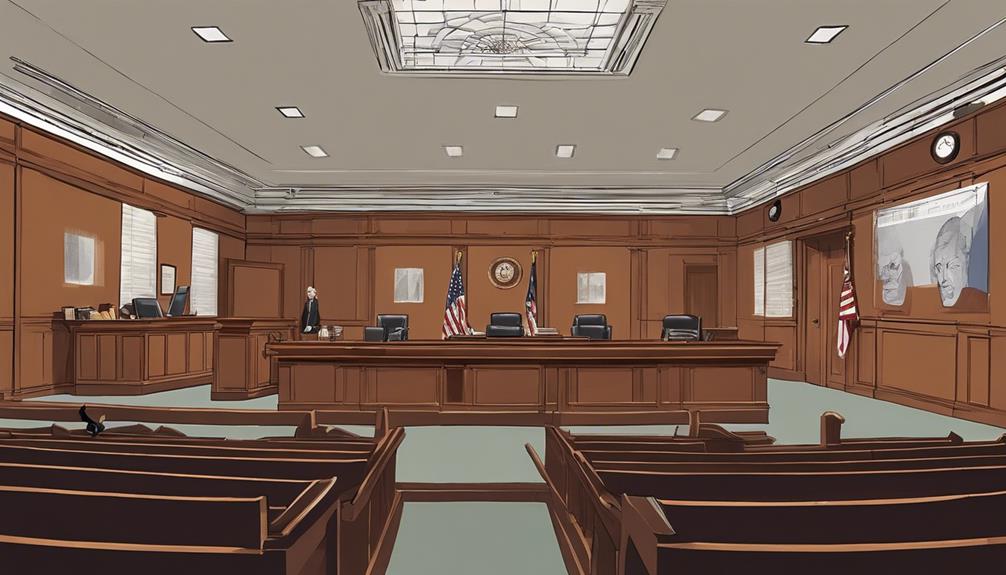During a revocation hearing, statistics show that a majority of individuals do not succeed in obtaining a favorable outcome. However, there are key strategies and techniques that can significantly increase the chances of success in such proceedings.
By understanding the nuances of the revocation hearing process and building a robust defense strategy, individuals can navigate this complex legal terrain with confidence.
Stay tuned to discover the essential steps and insider tips that can turn the tide in your favor when preparing for a revocation hearing.
Key Takeaways
- Thorough defense preparation is crucial.
- Gather strong evidence and credible witnesses.
- Communicate respectfully and confidently in court.
- Understand post-hearing procedures and comply promptly.
Understanding the Revocation Hearing Process
In navigating the revocation hearing process, we must grasp the critical steps leading to a determination of probation violations before a judge. During these hearings, evidence of probation violations is presented to the judge, who then assesses the situation to decide on potential consequences such as reinstatement, modification, or even jail time. It's essential to note that the burden of proof lies with the prosecution, requiring them to demonstrate violations by a preponderance of evidence. Unlike in regular criminal trials, hearsay evidence is admissible in revocation hearings.
Furthermore, the judge takes into consideration various factors when determining the outcome, including recommendations from probation departments, input from attorneys, mitigating circumstances, and relevant legal references. These elements play a crucial role in shaping the judge's decision regarding the probation violations presented during the hearing. Understanding these aspects can significantly impact the outcome of the revocation hearing process.
Building a Strong Defense Strategy

Crafting a robust defense strategy for a revocation hearing requires meticulous preparation and strategic planning. When facing a revocation hearing, it's crucial to develop a comprehensive defense strategy that addresses all aspects of the case. This includes gathering evidence to support your innocence, such as alibis, witnesses, or documentation.
Additionally, presenting mitigating evidence, such as completion of requirements, rehabilitation efforts, or positive changes, can strengthen your defense. Requesting credit for time served, if applicable, may also help reduce potential punishment. Intensive hearing preparation is essential; treating the hearing like a criminal trial by conducting thorough investigations can uncover weaknesses in the prosecution's case.
In instances where the prosecution has weak evidence, they may consider dropping probation violation allegations to secure a favorable outcome. By building a strong defense strategy that utilizes evidence, mitigation, and thorough preparation, you can increase your chances of achieving a favorable result in your revocation hearing.
Gathering Evidence and Witnesses
When preparing for a revocation hearing, meticulous attention to gathering compelling evidence and securing credible witnesses is paramount to constructing a robust defense strategy. Here are essential steps to effectively gather evidence and prepare witnesses for a probation violation hearing:
- Collect Documentation and Records: Gather any documentation, receipts, or records that can support your innocence or explain the alleged violation.
- Prepare Credible Witnesses: Identify and prepare witnesses who can testify on your behalf, providing relevant information to dispute the violation.
- Obtain Tangible Evidence: Obtain any surveillance footage, phone records, or other tangible evidence that can contradict the probation violation claim.
- Ensure Witness Credibility: Ensure your witnesses are credible and reliable, capable of providing detailed and accurate testimony to support your defense.
- Present a Convincing Case: Present a cohesive and compelling case with evidence and witness testimony to refute the alleged probation violation convincingly.
Communicating Effectively in Court

To effectively communicate in court, maintain eye contact with the judge and speak clearly to convey confidence and credibility during the proceedings. Remember to address the judge as 'Your Honor' and use respectful language to adhere to proper courtroom etiquette.
Actively listen to all questions and instructions attentively to demonstrate respect for the court proceedings. Avoid interrupting others while they speak and wait for your turn to address the court, showcasing a professional demeanor.
Dressing appropriately in business attire is crucial to show respect for the court and the legal process during the hearing. By embodying professionalism, following the dress code, and practicing good communication skills, you can enhance your credibility and make a positive impression on the judge.
Navigating Post-Hearing Procedures
After effectively communicating in court to convey confidence and credibility, the next critical step involves navigating post-hearing procedures to review the judge's decision and terms of reinstatement or modification. It's essential to understand any new conditions imposed and their impact on the probation terms. Comply promptly with all post-hearing requirements to avoid further violations and seek legal advice on appealing the decision or addressing any concerns post-hearing. Maintain open communication with your attorney to ensure compliance with all post-hearing procedures.
- Review the judge's decision and terms of reinstatement or modification post-hearing.
- Understand any new conditions imposed and their impact on the probation terms.
- Comply promptly with all post-hearing requirements to avoid further violations.
- Seek legal advice on appealing the decision or addressing any concerns post-hearing.
- Maintain open communication with your attorney to ensure compliance with all post-hearing procedures.
Frequently Asked Questions
What Might a Judge Do if He or She Determines That a Probation Violation Has Occurred?
If a judge determines a probation violation occurred, they may take various actions. They could reinstate probation with added conditions, modify terms to address the violation, or revoke probation and impose the original sentence. Judges consider factors such as the nature of the violation, the defendant's history, and any mitigating circumstances. Ultimately, the outcome hinges on the judge's assessment of both the violation and the defendant's circumstances.
What Violation Causes Revocation of Probation the Most?
Committing new criminal offenses is the most common violation leading to probation revocation. Failing drug tests frequently results in revocation due to substance abuse issues.
Missing reporting dates without valid reasons can also cause probation revocation. Non-compliance with mandated classes or services often leads to revocation.
Violating any probation conditions specified in the court order can trigger the revocation process.
What Is the First Stage of the Revocation Hearing?
At the first stage of a revocation hearing, the State files a Motion to Revoke Probation or a Motion to Adjudicate. These documents detail alleged probation violations leading to an arrest warrant.
Violations can range from new offenses to failure to comply with the terms of probation. The State carries the burden of proof, needing to establish violations by a preponderance of evidence before a judge, who ultimately determines the probation outcome.
What Is the First Step of the Revocation Process?
When we face a revocation process, the initial step involves the State filing a Motion to Revoke Probation or a Motion to Adjudicate listing alleged violations like new offenses or missed obligations. These allegations can lead to an arrest warrant, starting the revocation process.
The burden of proof in a revocation hearing typically relies on a preponderance of evidence, with no jury trial. Understanding these early stages is vital for crafting a solid defense and navigating the legal process effectively.
Conclusion
In conclusion, winning a revocation hearing requires meticulous preparation and a compelling defense strategy.
By gathering solid evidence, presenting convincing witnesses, and effectively communicating in court, one can greatly increase their chances of success.
Remember, just like a skilled artist mixes colors to create a masterpiece, crafting a strong defense is the key to achieving a favorable outcome in a revocation hearing.









